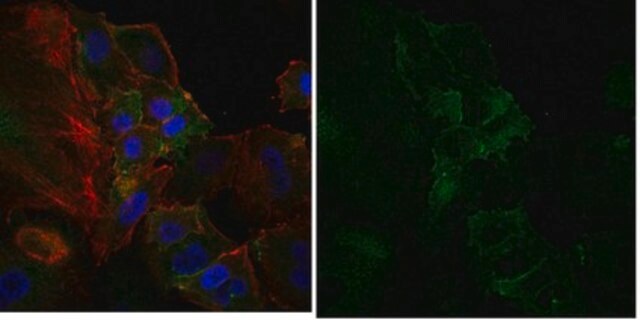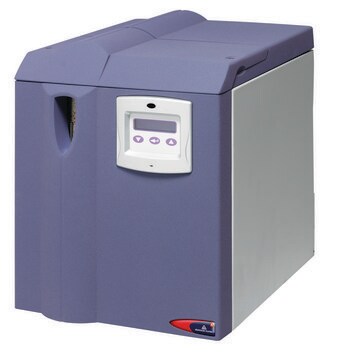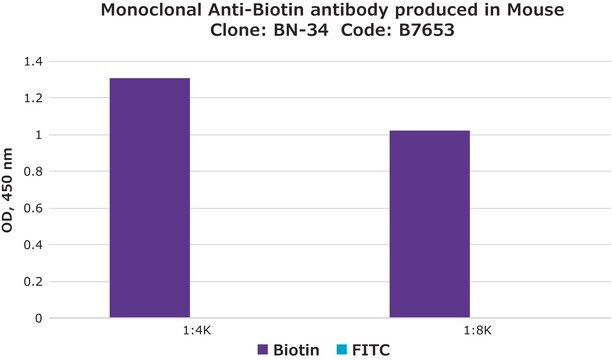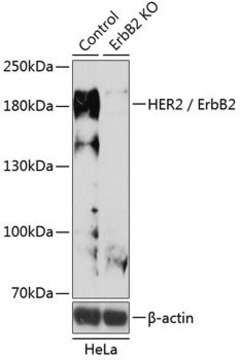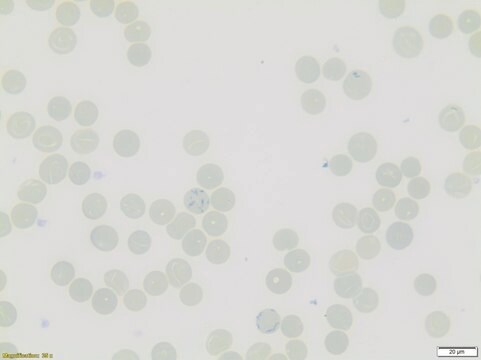おすすめの製品
濃度
≥50.0% (degree of coupling)
溶解性
DMF: 0.25 mg/mL, clear
蛍光検出
λex 635 nm; λem 655 nm±10 nm in PBS, pH 7.4
保管温度
−20°C
詳細
Absorption Maximum, λmax: 635 nm (PBS, pH 7.4)
Extinction Coefficient, ε(λmax): 110,000 M-1cm-1 (PBS, pH 7.4)
Correction Factor, CF260 = ε260/εmax: 0.26 (PBS, pH 7.4)
Correction Factor, CF280 = ε280/εmax: 0.38 (PBS, pH 7.4)
Fluorescence Maximum, λfl: 656 nm (aq. acetonitrile; MeOH)
655 nm (PBS, pH 7.4)
Recommended STED Wavelength, λSTED: 750 −780 nm
Fluorescence Quantum Yield, η: 0.88 (PBS, pH 7.4)
Fluorescence Lifetime, τ: 2.8 (PBS, pH 7.4)
Extinction Coefficient, ε(λmax): 110,000 M-1cm-1 (PBS, pH 7.4)
Correction Factor, CF260 = ε260/εmax: 0.26 (PBS, pH 7.4)
Correction Factor, CF280 = ε280/εmax: 0.38 (PBS, pH 7.4)
Fluorescence Maximum, λfl: 656 nm (aq. acetonitrile; MeOH)
655 nm (PBS, pH 7.4)
Recommended STED Wavelength, λSTED: 750 −780 nm
Fluorescence Quantum Yield, η: 0.88 (PBS, pH 7.4)
Fluorescence Lifetime, τ: 2.8 (PBS, pH 7.4)
アプリケーション
- Abberior® STAR 635 goat anti-rabbit antibody has been used for STED (stimulated emission depletion) imaging of primary cultured striatal neurons obtained from rats.
- Abberior® STAR 635 anti-rabbit antibody has been used for STED imaging of non-sensory supporting cells obtained from cochlea of rats and mice.
- Abberior® STAR 635 conjugated with secondary antibody has been used for STED imaging of microtubules in cells.
適合性
Designed and tested for fluorescent super-resolution microscopy
法的情報
abberior is a registered trademark of Abberior GmbH
保管分類コード
11 - Combustible Solids
WGK
WGK 3
引火点(°F)
Not applicable
引火点(℃)
Not applicable
適用法令
試験研究用途を考慮した関連法令を主に挙げております。化学物質以外については、一部の情報のみ提供しています。 製品を安全かつ合法的に使用することは、使用者の義務です。最新情報により修正される場合があります。WEBの反映には時間を要することがあるため、適宜SDSをご参照ください。
Jan Code
30558-1MG-BULK:
30558-1MG:
Hans Blom et al.
PloS one, 8(9), e75155-e75155 (2013-09-24)
The phosphoprotein DARPP-32 (dopamine and cyclic adenosine 3´, 5´-monophosphate-regulated phosphoprotein, 32 kDa) is an important component in the molecular regulation of postsynaptic signaling in neostriatum. Despite the importance of this phosphoprotein, there is as yet little known about the nanoscale
Jenu Varghese Chacko et al.
Journal of biomedical optics, 19(10), 105003-105003 (2014-10-08)
Atomic force microscopes (AFM) provide topographical and mechanical information of the sample with very good axial resolution, but are limited in terms of chemical specificity and operation time-scale. An optical microscope coupled to an AFM can recognize and target an
Arnaud P Giese et al.
Development (Cambridge, England), 139(20), 3775-3785 (2012-09-20)
Vangl2 is one of the central proteins controlling the establishment of planar cell polarity in multiple tissues of different species. Previous studies suggest that the localization of the Vangl2 protein to specific intracellular microdomains is crucial for its function. However
S W Hell et al.
Optics letters, 19(11), 780-782 (1994-06-01)
We propose a new type of scanning fluorescence microscope capable of resolving 35 nm in the far field. We overcome the diffraction resolution limit by employing stimulated emission to inhibit the fluorescence process in the outer regions of the excitation
Marcus Dyba et al.
Nature biotechnology, 21(11), 1303-1304 (2003-10-21)
We report immunofluorescence imaging with a spatial resolution well beyond the diffraction limit. An axial resolution of approximately 50 nm, corresponding to 1/16 of the irradiation wavelength of 793 nm, is achieved by stimulated emission depletion through opposing lenses. We
ライフサイエンス、有機合成、材料科学、クロマトグラフィー、分析など、あらゆる分野の研究に経験のあるメンバーがおります。.
製品に関するお問い合わせはこちら(テクニカルサービス)